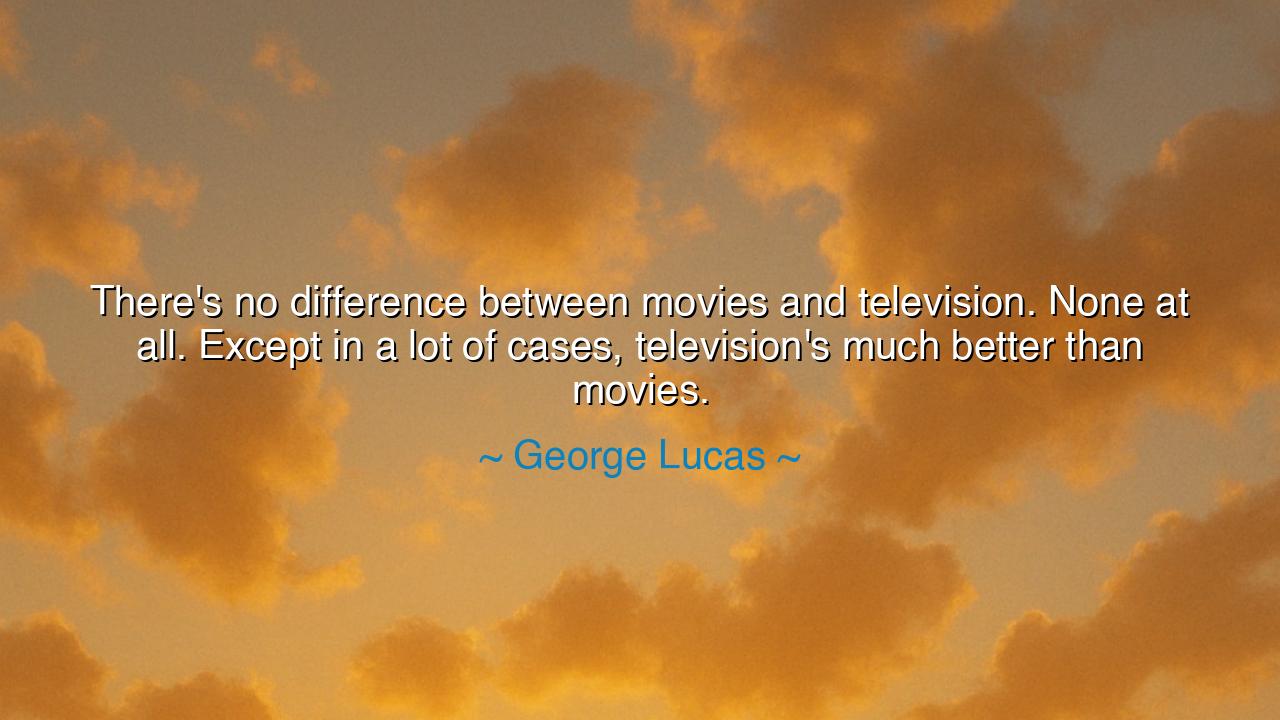
There's no difference between movies and television. None at
There's no difference between movies and television. None at all. Except in a lot of cases, television's much better than movies.






Listen closely, children, as I speak of the great truth in the words of George Lucas: "There's no difference between movies and television. None at all. Except in a lot of cases, television's much better than movies." In this declaration, Lucas challenges an assumption that has stood for centuries—that cinema, with its grandeur, its immersive spectacles, and its wide reach, is somehow superior to the more intimate and episodic world of television. He calls us to see that media, in all its forms, is but a reflection of human creativity, and what truly matters is not the medium itself, but how the story is told and how deeply it connects with the audience.
Consider, children, the ancient epic poems of the past—works like Homer's Iliad and Odyssey. These were stories not told in a single sitting, but shared over many nights, with each passage weaving a deeper understanding of the characters and their journeys. Just as television allows for a prolonged engagement with a story, so too did these ancient narratives unfold over time, allowing the audience to truly grow with the characters. In this way, the episodic nature of these tales, the gradual revelation of themes and character arcs, mirrors the impact of the modern television series. The sagas of old were not simply about one moment, but about many moments strung together to create something of greater meaning.
George Lucas, a master of visual storytelling, speaks here not only of the medium but of its evolution. Movies and television, once distinct in their methods of delivery, have converged in the modern world. And yet, Lucas points to an essential truth: that the quality of the storytelling is what defines the experience, not the platform. In the ancient world, the Orators of Rome, such as Cicero, would captivate audiences not through grand spectacles, but through their ability to weave compelling narratives, drawing the audience into their world with words alone. The platform of their speeches mattered less than the impact of their messages. Similarly, the world of movies and television is a reflection of the same human need to connect, to understand, and to be moved.
Just as the ancient storytellers shaped their narratives to suit the audience, so too do modern creators of both television and film. In many cases, television has the advantage of time. Consider the tale of King Arthur and his Knights of the Round Table. Over the centuries, this story has been told through many different lenses—whether through film, television, or the written word. Yet, the depth and complexity of Arthurian legend is often best captured in the episodes that allow for the slow unveiling of character and the development of themes. The same can be said of modern television series like Game of Thrones, where the long arcs of characters are explored in a way that movies, with their constraints, often cannot achieve.
This, children, is the crux of George Lucas' wisdom: the difference between television and movies is not inherent in the forms, but in the freedom and time that each offers. A movie may offer grandeur and immersion, but it is often limited by time, often constrained to a singular vision or event. In contrast, television allows for multiple layers, for subplots, for deeper character exploration, and for an ongoing connection between the audience and the story. The modern era has proven that a television show can rival, and often surpass, the emotional depth and complexity that movies have traditionally offered. This is why, in many cases, television has become the preferred medium for stories that require time, development, and the exploration of the human spirit.
So, children, let this lesson resonate with you: it is not the medium that defines the story, but the story itself. Whether in the form of a grand movie or a small screen series, it is the heart of the tale that captivates the soul. The ancient Greeks, in their tragedies, understood that the duration and depth of a story could evoke more profound emotions than a quick, fleeting narrative. They did not need a cinema screen to convey the weight of human suffering and triumph. The truth of storytelling, and of our connection to it, lies not in how it is delivered, but in how it speaks to the very core of our human experience.
As you walk through life, children, remember this: art is not defined by the platform but by the message it carries. In your own journey, you will encounter moments of both grandeur and intimacy, and each has its place in the grand tapestry of your story. Do not seek the limelight or the spectacle as your only measure of success. Sometimes, it is in the quiet moments, the small, steady steps, that the most profound truths are revealed. The world will often place value on size or scale, but true wisdom lies in the depth of the story you choose to tell, and in the time you invest in telling it well.






AAdministratorAdministrator
Welcome, honored guests. Please leave a comment, we will respond soon